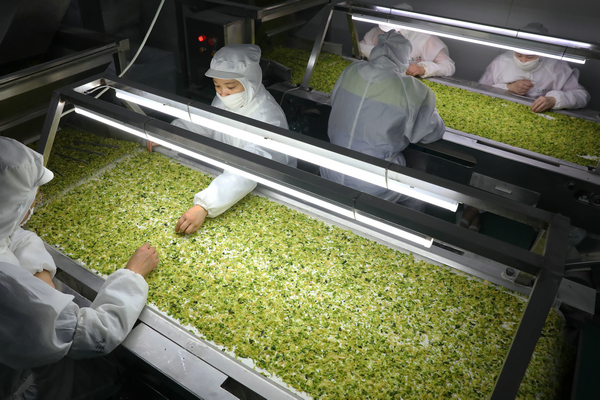Dehydrated vegetable companies witness robust demand for products

Employees check dehydrated vegetable products at a manufacturing facility in Taizhou, Jiangsu province. YANG BO/CHINA NEWS SERVICE
Instant food sales surged globally after the novel coronavirus outbreak earlier this year, as more people started remaining at home and consuming snack products. Dehydrated vegetables, a major ingredient in most of the convenience food products, saw a rebound in sales in the domestic as well as overseas markets.
Consumers from the United States, Europe, Japan and South Korea, which have been hit hard by the pandemic, have been increasing their convenience food purchases and companies have been sourcing the same from markets like China. During the first four months of this year, Huzhou, a city in Zhejiang province in East China, exported more than 800 metric tons of dehydrated vegetables, up 81.3 percent on a yearly basis. The export value of the products was 20 million yuan ($2.94 million), up 78.1 percent on a yearly basis, according to the local government.
"We thought the pandemic would negatively affect our business, but the number of overseas orders increased after we restarted production, and hence we had to keep increasing our production capacity," said Qian Qin, general manager of Huzhou Fresh Food Co Ltd, a major retailer of dehydrated vegetables. The company, however, did not disclose exact volume of sales, according to a report published in Qianjiang Evening News.
Huzhou Fresh Food's dehydrated vegetables were mainly exported to the United States and Europe. Some of its products like dehydrated tomatoes, red peppers and cabbages were exported to Belgium, said company officials.
Xinze Food Industry Co Ltd, a dehydrated vegetable maker based in the Xinjiang Uygur autonomous region, has been successfully processing onions and carrots and exporting them to Europe and Southeast Asian countries. The company has set up a factory with an initial investment of 80 million yuan, which can process about 10,000 tons of fresh vegetables into dehydrated vegetables every year.
Xinze plans to further expand its production capacity and build more vegetable dehydration assembly lines, while systematically developing its deep-processing capacity.
Even as the frozen vegetable companies are expanding their production capacities, they are also finding new use for their products in popular snack products like instant noodles to attract more consumers.
Companies have come up with instant noodle products containing common vegetables such as beans, celery, green pepper, cucumber, sweet potatoes and potato chips and the same are dehydrated via freeze vacuum drying before being added to the noodles. The dehydrated vegetables can retain their original color and taste after a few minutes of being immersed in hot water along with the noodles.
"Consumers expect convenience food products to taste more like freshly-made meals, and retailers are launching more varieties to cater to the new demand. Instant food innovations should offer more added value in terms of flavor, food safety, healthiness, quality of raw materials and production technologies," said Annie Jiang, a food and beverage analyst at Mintel.
That said, products like high-calorie biscuits, chocolate and candies are no longer as popular as they used to be in China, said industry experts. In the domestic market, fruit and vegetable crunches are the new categories that are gaining traction, they said.
Major Chinese snack makers such as Wuhu, Anhui province-based Anhui Three Squirrels Electronic Commerce Co Ltd, and Wuhan, Hubei province-based Bestore Food Co Ltd, have benefited from the trend, since they have been developing healthier and high-quality snacks like fruit and vegetables crunches in recent years.
In fact, besides edible oil, rice and noodles, dehydrated vegetables and crunches can also serve as an important disaster prevention food. Unlike fresh vegetables, dehydrated vegetables have a long shelf life and taste good when cooked, while retaining the nutrition.
Still, the scale of the dehydrated vegetable segment is relatively small in China. The growth of the sector can provide more business opportunities and sales channels for rural vegetable farmers, said industry experts.

 Print
Print Mail
Mail
 20 Cultural Symbols
20 Cultural Symbols Why Zhejiang
Why Zhejiang Experiencing high-tech products at WIC
Experiencing high-tech products at WIC Zhejiang Release
Zhejiang Release Zhejiang News
Zhejiang News